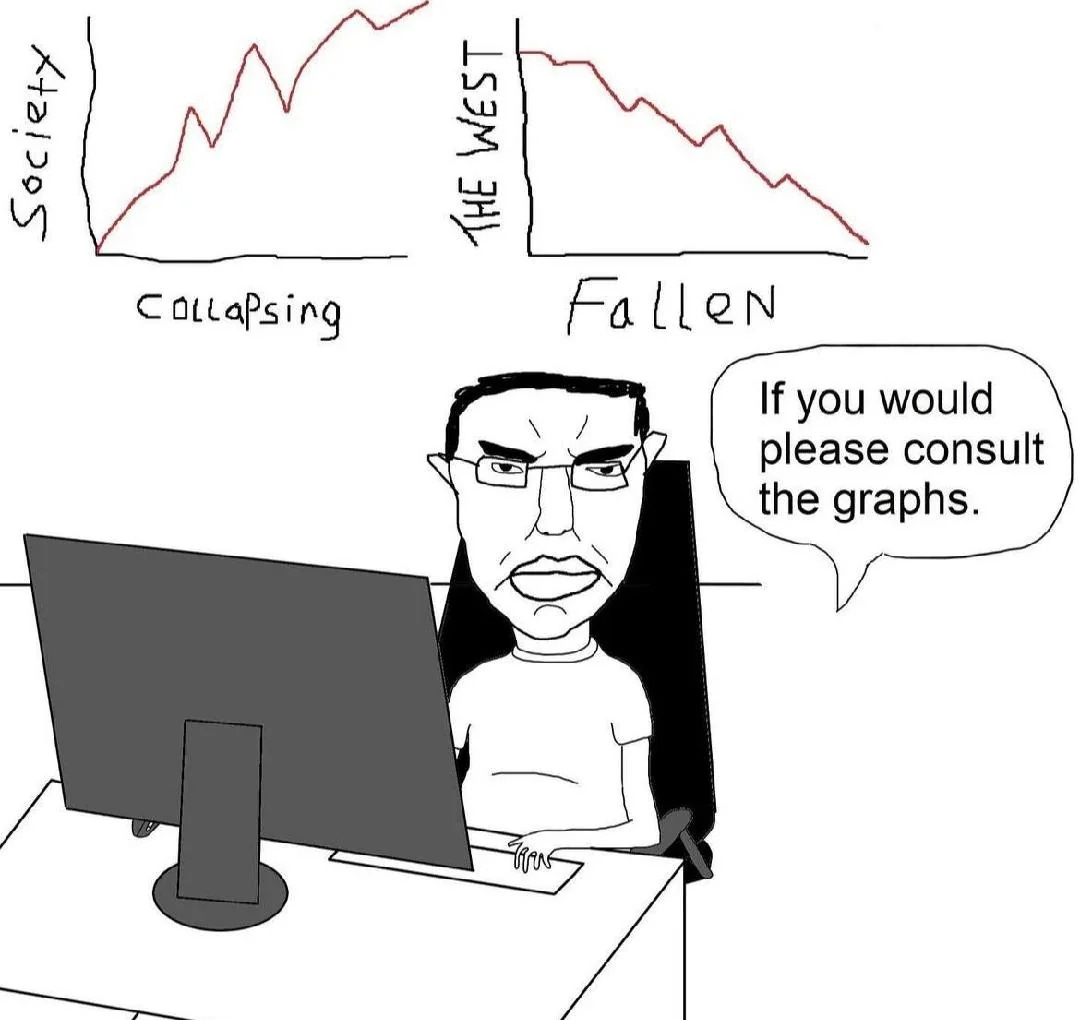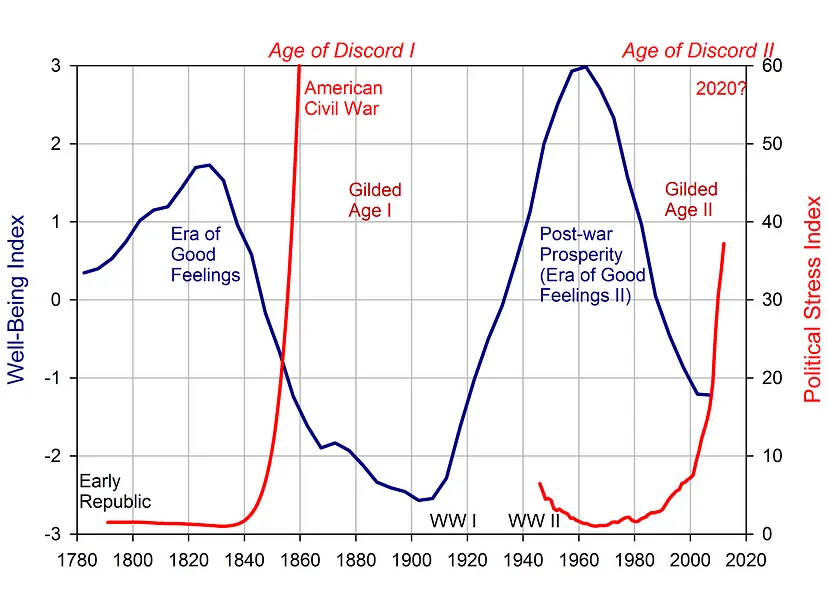I normally refrain from commenting on this stuff but this just had to come out.
A common theme among the writers I follow on Substack is all the bad things happening in the West. Population stagnation, competency crisis, electrical grid policies increasing prices and decreasing reliability, unlivable economics, crushing wealth inequality, loss of social cohesion to the point of atomization and the loneliness epidemic, inflation, cost of living – I could go on and on. If the dissident commentariat is to be believed, all the arrows are moving in the wrong direction and the gravy train is about to suffer a sudden and violent separation from the rails, spilling the gravy all over the countryside with all the attendant pollution and clogging up of the rail line that that entails. It brings to mind a Paul Samuelson quip from 1966[1]:
“The stock market has predicted nine of the last five recessions.”
If the article to be believed, the stock market’s tally now stands at 13 of the last 7 – an even worse record than before. Considering apocalypse predictions as a whole, however, I’d say it’s pretty good.
50% Off the End of the World
Apocalypse predictions are nothing new. The end of the Mayan calendar in 2012 is the one I remember most vividly – it even had a whole movie dedicated to it, if you remember. Post-apocalypse fantasies are an undying theme – remember the zombie craze with The Walking Dead (11 seasons and plenty of spinoffs), The Last of Us (2 games, a TV show, and so on), I Am Legend (blockbuster starring Will Smith and a dog), and World War Z (bestselling book + movies)? I remember, and they’ve got a competitor in the natural disaster film. Cloverfield had the giant alien monster stomping around looking for its kid, and had two sequels. The Day After Tomorrow had the world ending thanks to runaway global heating, while Snowpiercer took the opposite tack and had the whole world freeze after a geoengineering attempt gone wrong. AI taking over? Terminator (film franchise) got you covered – or at a smaller scale, 2001: A Space Odyssey. Both explore the ruinous consequences of giving too much power to our nascent silicon overlords.
I could go on, but I’ll just point you to Wikipedia’s non-exhaustive list of post-apocalyptic media, or I could just point you to a universe where apocalypses are an everyday occurrence – something like Warhammer 40,000, which is grim dark dark grimness in the far future, in a galaxy exactly like our own. Because it is. That’s right, the time travelers from Nottingham know how it all ends, and have written a primer to prepare us for the worst. Memento Mori[2] isn’t a piece of advice, it’s a statement of fact. To my mind, though, we do a little too much remembering of that fact for that to be all we’re doing.
Better writers than me have plumbed the depths of this obsession. Some think it’s born of a latent desire to break free of the constraints of society and the reader’s current situation in life, a fantastical breath of fresh air in a suffocating, constricting world that brooks no deviation. One could also become obsessed with predictions of the apocalypse from the kind place of wanting to avoid the end of the world. Some think it’s a perverse obsession with the end, perhaps a suicidal ideation or tendency. You could also reformulate it into dissatisfaction with current society, a desire to burn it down and wipe the slate clean so we can start a new and better world – for the people, as the Internet-beloved Senator Armstrong would say.

One thing tends to be common to apocalypse and post-apocalypse fiction. Most of the time, it comes quickly, suddenly, throwing people out of their current lives and quickly forcing them into new routines to survive. Like shock therapy – whether electrical shocks delivered to the brain or the economic shock therapy of the Soviet Union in the 1990s, the idea seems to be that sudden change causes sudden response – everything seems to go wrong all at once, perfect for the rising action or introduction of a story. A quick event allows for a sharp peak in dramatic tension, giving the watcher a quick shot of adrenaline and a desire to know more.
Reality is not so kind.
Dragging It Out
Quite unlike apocalypse fiction, the declines we observe in real life, particularly now, are protracted, painful things that leave us on the edge of our seats, wondering if this will be the Happening or the Apocalypse. Like a plane with the engines cut over the endless ocean, those in the cockpit can see the water coming, the passengers feeling the sinking of their guts as gravity inexorably pushes them down into the sea, the silence of the engines replaced by screaming, crying, praying, and the hammering of hearts. The collapse is slow enough that we can comment on it as it passes by, like two guys standing to the side while a train wreck happens in slow motion.
We have observed so many declines, at detail and at length, that we have plenty of theories of them, often taking the form of cycles. The simplest of these is the “hard times create strong men” cycle, detailed below.
The more scholarly Strauss-Howe Fourth Turning is also advanced quite often. It splits people into four generational cohorts, each spanning twenty years. These four generational cohorts have different characteristics in a predictable cycle of four types, forming an 80-year cycle for societies.
There’s also the almost economic models of Peter Turchin’s Cliodynamics that hold rising inequality and elite overproduction and pointless competition as causes of times of decline. These times end with explosions of civil conflict – war, political upheavals, and displacement of the elite leading to a redistribution of resources and a cry for peace until the whole thing starts over again, in a neverending cycle.
The quest to predict and potentially head off or profit from conflict and wild swings is eternal, but one thing common to all of them is this – the real apocalypse is sloooooooow. Things fall apart in a million tiny ways as the inertia of society keeps it moving, rather than a sudden, disastrous snap turning it all wrong in a single moment. This, of course, is a great way for news organizations to make hay and sell methods of preparing before it all goes down, despite it being a long way away. Things will be normal for a long time yet until they suddenly aren’t, especially if you’re used to positive progress on positive progress, as the West has basically had since the end of World War Two.
Expecting something and getting less feels bad. Neutrality or even regression feels so much worse.
The Graypill
Look, I’m not saying things aren’t getting worse for lots of people, or that pain isn’t on the way. In the decades since the end of the Second World War, the West has been on the upswing, able to count on year-on-year growth and prosperity. To sustain that prosperity has required pulling in the resources of the whole world, pushing manufacturing and agriculture out and keeping finance, software, precision manufacturing, and other scalable or high-knowledge-and-therefore-value services in. These digital services only have digital limits, or require smaller, more precise manufacturing, while physical products have physical limits, leaving the old physical workforce without work. This has made many people less able to earn a living just as the dollars flow out of the rest of the world and then back into US/EU real estate and investment products, pricing the poor locals out. Much more digital ink has been spilled on this topic in much better ways.
I think a large part of the pessimism, however, comes from the betrayal of existing optimism. Until around 2008 (more or less, depending on your situation), things were looking up, optimism about the economy and the world going up if under siege, buoyed by leaps and bounds in technology and the stock market. After then, though, confidence was shaken, the inequality of these gains came to the fore, and, at least from my perspective, the wheels of the system really began to come off and expectations began to sour. That pessimistic shock is hard to come to terms with, particularly for those older than me, who were economically active at the time (I was 12).
Reactions to this differ. Some believe in the future and continue to hold aloft moderated, if still positive, expectations. There are those who accept decline as inexorable and simply attempt to weather the storm. For some, it can be a sign to pick up sticks and leave. Others will elect to rage, rage against the dying of the light. No matter what you do, though, I think that it’s quite easy to demonstrate that it could be a lot worse. Call the statistics or impressions doctored, but there are plenty of places where things could be far worse.
Most important of all, remember that all is not lost. No matter how profitable or popular it is to say that things are bad and it’s all over, the fact that you can complain rather than work your ass off about it is a sign that they’re not that bad yet – the patient who can still scream and yell has the energy for it, the patient who isn’t talking is the one who needs the attention. With the world moving towards an attention economy and endless doomscrolling, doom and gloom sells likes and subs, so expect more and more blackpills on your feed. Making doomsday predictions is an old business model - going back to Nostradamus, the Oracle of Delphi, and even further beyond.
The blackpill is a profitable self-fulfilling prophecy.
This essay was brought to you by untimely caffeine, the first draft mostly written in a straight shot long after I should have gone to sleep. If you’d like more of this unhinged ranting, buy me a coffee at the button below:
[1] https://www.cnbc.com/2016/02/04/can-the-markets-predict-recessions-what-we-found-out.html








There is something about the fascination with negative fantasy that would be good to get to the bottom of. You, Argo, might be the most connected person I know, because I have never heard of most of these adventures, and if I have heard-tell of them, I certainly have never visited nor listened to one of them. My definition of them is that they are repellent.
Do you suppose if you are in Gaza, you check your smart phone to see the latest episode of The Walking Dead? How about if you live in the Ukraine and bombs are raining down every night? If it is winter and you just escaped from a Turkish refugee camp and are running across a snowy field with a three-year-old on you shoulders, climbing a barbed wire fence and trying to get to Europe, do you pause to wonder about the latest episode of your favorite American show?
Probably you despise Americans for making fun of your true horrid circumstances with their lurid fantasies. They may want to burn everything down, but for you life has already been incinerated, (maybe in only one day.) Who is there to rebuild those ashes? It will surely be worse by orders of magnitude.
There is a tremendous inertia of society, but the supply chains that urbanization depends on are much more fragile that we can imagine. Take Japan's loss of WWII as an example. They had all the supplies, food, fuel and ammunition they needed for a two year ground assault by America. In the two week delay of signing off on their defeat, and the entering of the occupying forces, all that food and fuel disappeared, and reappeared in the black market at 400% of the former price. America did nothing about it for 4 or 5 years until it dissipated.
When will Ukraine get back to anything "normal"? Even before the war their GDP/capita was $10 per day. Yet Russia has a stronger economy than ever, and its strongest employment.
_____________
That's an interesting statement: that the pessimism comes from betrayal of the (pre)existing optimism. (While some still hold up positive expectation). What is the role of "hope"? I think without hope, all that is left is cynicism. This cynicism must be the fascination with the negative. How to construct a scenario of hope out of the dismal trajectory of today? That may be our challenge.
For ease of understanding, I divide the world into two camps. Those that are life positive and those that are life negative. There is a long history to it. It means the people who try to build something, and those that want to destroy everything, while grabbing their share on the way down. A big part of the Internet appeals to the destroyers.
Take your choice, and support what feels right to you. And the blackpill is surely a self-fulfilling prophecy.
.